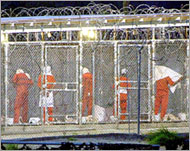CIA ‘has secret terror jails’
The CIA is holding some of its most important suspect al-Qaida captives in a network of secret prisons including one at a Soviet-era facility in Eastern Europe, the Washington Post has reported.

According to the paper the locations of the facilities “are known to only a handful of officials in the United States and, usually, only to the president and a few top intelligence officers in each host country.”
The facilities are referred to as “black sites” in classified White House, CIA, Justice Department and congressional documents, the Post said.
The report did not disclose the names of the Eastern European countries involved in the programme, at the request of senior US officials. Officials believed disclosure might disrupt counterterrorism efforts in those countries and elsewhere.
The secret facilities are part of a covert prison system set up by the CIA after the September 11 attacks, that at various times has included sites in eight countries, including Thailand, Afghanistan and several democracies in Eastern Europe, the Post reported.
Another small center operated at the Guantanamo Bay prison complex in Cuba, according to current and former intelligence officials and diplomats from three continents, the paper said.
Prisoner information
 |
|
A small CIA center operated at |
Virtually nothing is known about who is kept in the facilities or what interrogation methods are used.
But the revelations of widespread prisoner abuse in Afghanistan and Iraq by the US military – which operates under published rules and transparent oversight of Congress – have increased concern among lawmakers, foreign governments and human rights groups about the opaque CIA system.
The CIA has sent more than 100 suspects to the hidden global internment network, the Post said, indicating that the number was a rough estimate and did not include prisoners picked up from Iraq.
|
“We never sat down, as far as I know, and came up with a grand strategy” Former US intelligence, quoted in Washington Post |
Considerable concern lingers about the legality, morality and practicality of holding even unrepentant terrorists in such isolation and secrecy.
“We never sat down, as far as I know, and came up with a grand strategy,” the paper quoted one former senior intelligence officer who is familiar with the programme but not the location of the prisons.
“Everything was very reactive. That’s how you get to a situation where you pick people up, send them into a netherworld and don’t say, ‘What are we going to do with them afterwards?'”
Security concerns
Citing national security concerns the CIA and the White House have dissuaded Congress from demanding that the agency answer questions in open testimony about the conditions under which captives are held.
 |
|
Gonzales (L) refused to comment |
US Attorney General Alberto Gonzales, speaking on CNN on Wednesday, was evasive when asked about the report.
“I’m not going to confirm or deny on this show the existence of this programme. We normally do not talk about intelligence activities,” Gonzales said.
In a comment from the White House, spokesman Scott McClellan said, “I’m not going to get into specific intelligence activities. I will say that the president’s most important responsibility is to protect the American people.”
But former president Jimmy Carter denounced what he said was “a profound and radical change in the basic policies or moral values of our country” in reaction to the report.
“This is just one indication of what has been done under this administration to change the policies that have persisted all the way through our history,” said Carter, who championed human rights during his 1977-81 presidency.
Eastern Europe denial
The existence of secret CIA detention centres has long been claimed. Amnesty International denounced the “archipelago” of prisons in June as a “gulag of our times”.
But the report that former Eastern European countries were among the locations is new.
|
“The negotiations took place around a month ago” Frantisek Bublan |
Czech Interior Minister Frantisek Bublan was quoted by the on-line news outlet Aktualne.cz as saying that the Czech Republic recently turned down a US request to set up a detention centre on its territory.
“The negotiations took place around a month ago,” he was quoted as saying. The Americans “made an effort to install some of the sort here, but they did not succeed.”
Separately, Hungary’s intelligence chief, Andras Toth, told AFP that Budapest had not been approached.
“The mere suggestion of this is absurd,” Toth said, adding “I know of no such request” from US officials.
Russia’s FSB security service, the main KGB-successor agency that leads the country’s battle against militant violence, denied any such facilities on its territory, as did the Bulgarian Foreign Ministry.
“There is no detention centre of that nature in Slovakia,” ministry spokesman Richard Fides told the news agency CTK.
Vladimir Simko, spokesman for Slovakia’s intelligence service SIS, told CTK that even if Slovakia did collaborate with the CIA, he could not tell the press.
In Sofia, the foreign ministry spokesman Dimitar Tsanchev denied there were any such American bases in Bulgaria. “Bulgaria has never had CIA bases or bases for foreign detainees linked to al-Qaida,” he said.
In Thailand, which was named along with Afghanistan as the location of “black site” facilities in the Washington Post report, government spokesman Surapong Suebwonglee said there was “no fact in the unfounded claims” carried by the paper.